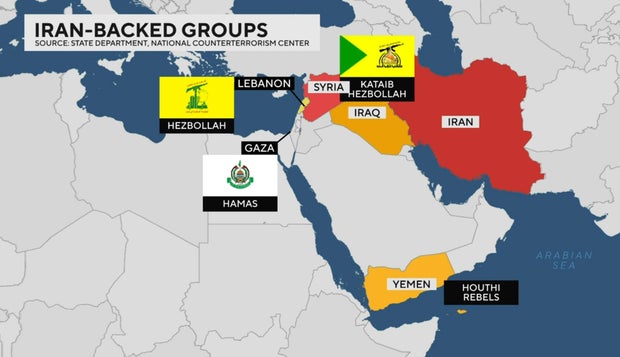Sirens rang out in Tel Aviv and across Israel and loud booms were heard late Tuesday after the Israel Defense Forces said missiles were launched from Iran toward the country.
“The IDF is doing and will do everything necessary to protect the civilians of the State of Israel,” the military said in a statement, adding that people in Israel should stay in protected areas “until further notice.”
“The explosions you hear originate from interceptions or falls [of missiles]. The air defense system detects and intercepts threats all the time,” the IDF said.
The explosions rang out hours after a senior White House official told CBS News the U.S. had “indications that Iran is preparing to imminently launch a ballistic missile attack against Israel.” That warning, which Israel’s military said had been communicated from Washington, came hours after Israel announced the beginning of “limited, localized, and targeted ground raids” against the Iran-backed group Hezbollah in Lebanon.
“We are actively supporting defensive preparations to defend Israel against this attack,” the White House official said, adding that any direct “attack from Iran against Israel will carry severe consequences for Iran.”
Israel Defense Forces spokesman Rear Admiral Daniel Hagari said Tuesday that U.S. officials had informed the IDF that Iran could fire missiles “in the near future.”
“At this point, we still do not detect an aerial threat launched from Iran towards Israel,” Hagari said, adding: “We have dealt with this threat in the past and we will deal with it now as well.”
The U.S. Embassy in Israel issued a security alert Tuesday telling all U.S. government employees and their families to shelter in place “as a result of the current security situation.”
Iran last fired a salvo of ballistic missiles at Israel in April, in retaliation for an Israeli strike on the Iranian consulate in Syria’s capital, which killed a number of senior Iranian military commanders.
Iran launched more than 300 missiles and drones at Israel in that April attack, but Hagari said at the time that virtually all of the weapons were intercepted before entering Israeli territory, and he reported only minor damage to one military base from the few missiles that did land in the country. One 10-year-old girl was “severely injured by shrapnel” from an intercepted missile, but the IDF reported no additional casualties.
U.S. officials told CBS News Tuesday that a new attack from Iran could be as large or larger than the one in April. The officials said Iran has been ready to strike Israel again on short notice since early August, when Tehran threatened to retaliate for the assassination of Hamas leader Ismail Haniyeh in Tehran.
The IDF spokesman said Tuesday that Israeli Air Force planes were patrolling the skies “and our defense systems are at peak readiness.”
An Iranian diplomatic source told CBS News on Tuesday that the country’s leadership was “under heavy pressure to take action” against Israel amid the escalating attacks on its close ally Hezbollah, adding that many senior officials in Tehran believed Israel was trying to provoke an attack. The source said they believed any Iranian strike on Israel would be limited in scope.
President Biden has called repeatedly for a cease-fire amid weeks of escalating fire between Israel and Hezbollah over the southern Lebanon border. U.S. officials at the White House, State Department and Pentagon have all made clear the risks of an all-out war between Israel and the well-armed Iranian proxy group in Lebanon, warning that it could spiral into a broad regional conflict.
CBS News
On Sept. 30, Pentagon Deputy Press Secretary Sabrina Singh told reporters that a number of American units already in the Middle East would have their deployments extended, and the forces due to replace them would instead overlap. That includes F-16, F-15E, A-10 and F-22 fighter aircraft and the personnel who operate the planes, she said, amounting to an increase of an “additional few thousand” U.S. troops in the region.
U.S. defense officials told CBS News Tuesday that there are currently more U.S. military capabilities in the region, including 40,000 American troops, than there were when Iran launched its direct missile attack on Israel in April.
Iran backs a range of groups across the region, including Hezbollah, Hamas and the Houthi rebels in Yemen. Tehran refers to these groups as a “resistance front” against Israel’s decades-long occupation of Palestinian territory, while Israel refers to it as an axis of evil with the ideological goal of wiping the Jewish state off the map.Hezbollah’s calls its rocket and drone attacks on Israel a legitimate support and defense of Palestinians in Gaza and the Israeli-occupied West Bank, and the Houthis have claimed the same rational for their months-long targeting of commercial and military vessels in the Red Sea.
One of the biggest risks for the U.S. is that Iran’s proxy groups — including smaller militias based in Iraq and Syria — will target American forces in the region in retaliation for Washington’s support of Israel. They have already done so since Oct. 7, firing rockets and drones at U.S. bases more than 165 times. Most of the attacks cause little to no damage, but a January drone assault on a U.S. outpost in Jordan, claimed by an Iran-backed group in Iraq, killed three U.S. troops and wounded dozens.
Before the White House official told CBS News about Iran’s purported plans for a missile attack, Israel’s military tightened domestic security precautions in much of the country on Tuesday. Among the new measures announced by the IDF’s Homefront Command, were limits on the number of people permitted to gather in public across much of northern Israel, near the Lebanon border.
,
Eleanor Watson,
Charlie D’Agata and
Margaret Brennan
contributed to this report.


